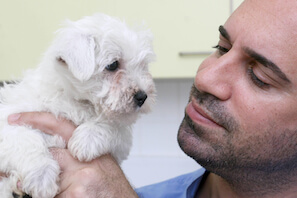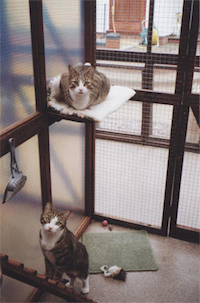How To Choose A Cattery, Kennel Or Pet Sitter

Continuing the holiday theme, vet Marc Abraham discusses the options for the care of your pet if you go away during the summer
Last week, I wrote about holidaying in the UK with your pet. However, if you do find yourselves holidaying abroad this year and must leave your pet behind, you'll want to know that they're safe and happy until your return. But who's trustworthy enough to care for your beloved pet, giving you piece of mind while you're sunning yourself on a beach hundreds of miles away?
Deciding between a petsitter or a boarding kennel or cattery can be tough. Would your pet prefer activity and the company of other pets in a kennel situation, or would they be happier in the comfort of their own home and routine? Perhaps your pet has special medical needs (such as arthritis or diabetes) that would help determine which type of care is best?
Recommendations by friends and family are a good starting point. If choosing a petsitter, check their personal references and invite them to an introductory meeting at your home to meet the pet, discuss care, and plan visits. If boarding your pet, request a tour of the facilities before booking - check for overall cleanliness, feeding and exercise timetables, and staff friendliness, knowledge and willingness to accommodate any individual pet requirements or deal with emergency situations.
 A good example of a cattery (image courtesy of Feline Advisory Bureau: www.fabcats.org)
A good example of a cattery (image courtesy of Feline Advisory Bureau: www.fabcats.org)
Boarding kennels can sometimes offer your dog more attention, supervision and security than if you leave it home alone to be visited by petsitters once or twice daily, as well as having staff who are trained to spot any health problems. However, it's important to remember that some dogs get stressed in unfamiliar environments, so kennels that offer additional services such as grooming, training and bathing may benefit dogs that are more dependent on human contact.
Catteries are usually 'outdoor' or 'indoor', depending on the presence of outside runs, and preferably employ sneeze barriers (pictured), with ideally no possibility of cats coming into direct contact with each other (apart from those normally living together at home). Cats also love scratching posts, toys and shelves, and need adequate space to exercise and move around.
Whatever you decide, ensure that your pet's vaccinations are up to date (with a certificate) well in advance of your departure. Vaccinating on the day you leave may satisfy the requirements of the kennel or cattery, but may not be the best disease protection for your pet. If your pet is boarding, bringing its own toys, blankets, treats, familiar unwashed bedding and food can also help to reassure it, reducing stress and the chances of an upset stomach.
Finally, have a great trip, knowing that your pet is in good hands and will be happy to see you when you return!
Marc Abraham is a TV vet who regularly gives the nation pet advice on This Morning, BBC Breakfast and Daybreak. As well as promoting responsible pet ownership, rescue pet adoption, microchipping and responsible dog breeding, Marc is also an active campaigner against the puppy farming industry and is the founder of Pup Aid. Marc has also written the books Vet on Call and Pets in Need and also has the Canine Care iPhone app for dog owners. For more about Marc, visit www.marcthevet.com or follow him on X @marcthevet

